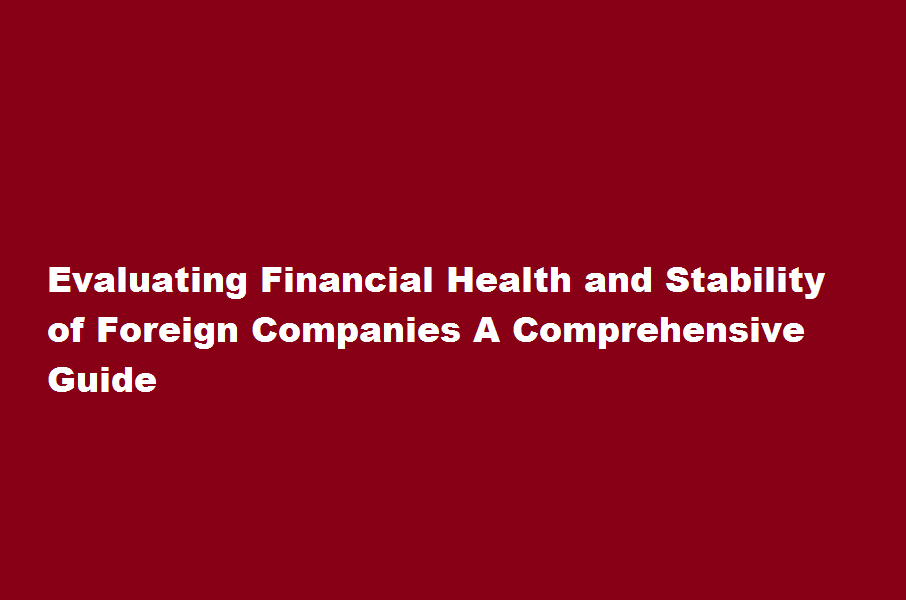Evaluating Financial Health and Stability of Foreign Companies A Comprehensive Guide
4 min read
Introduction
When investing in foreign companies, it is essential to evaluate their financial health and stability. Assessing the financial strength and sustainability of international companies requires a comprehensive analysis of key indicators, ratios, qualitative factors, and research methods. This guide provides investors with effective strategies to evaluate the financial health and stability of foreign companies. By understanding these evaluation techniques, investors can make informed investment decisions in global markets.
Financial Statements Analysis
- Balance Sheet Review the balance sheet to assess the company’s assets, liabilities, and equity. Analyze key items such as cash and cash equivalents, accounts receivable, inventory, and long-term debt. Look for signs of financial stability, adequate liquidity, and manageable debt levels.
- Income Statement Evaluate the company’s revenue, expenses, and profitability. Analyze revenue growth, gross margin, operating income, and net income over a period of time. Assess the company’s ability to generate consistent and sustainable profits.
- Cash Flow Statement Examine the company’s cash flow from operating activities, investing activities, and financing activities. Evaluate the company’s ability to generate positive cash flow, fund operations, and invest in growth opportunities.
Financial Ratios
- Liquidity Ratios Calculate ratios such as current ratio and quick ratio to assess the company’s ability to meet short-term obligations. Higher liquidity ratios indicate better financial health and ability to cover short-term liabilities.
- Solvency Ratios Evaluate solvency ratios such as debt-to-equity ratio and interest coverage ratio to assess the company’s long-term debt obligations. Lower debt levels and higher interest coverage ratios indicate better financial stability.
- Profitability Ratios Analyze profitability ratios such as gross margin, operating margin, and net margin. Compare these ratios with industry benchmarks to evaluate the company’s profitability and efficiency.
- Efficiency Ratios Assess efficiency ratios such as inventory turnover ratio and accounts receivable turnover ratio. Higher turnover ratios suggest better management of inventory and accounts receivable, improving cash flow and profitability.
Qualitative Factors
- Management Competence Evaluate the company’s management team, their track record, and their strategic vision. Consider their experience, leadership qualities, and ability to navigate industry challenges.
- Competitive Advantage Assess the company’s competitive position, unique strengths, and market differentiation. Identify factors that give the company an edge over competitors and sustainable growth potential.
- Market Positioning Analyze the company’s market share, customer base, and growth opportunities. Consider the company’s ability to adapt to changing market conditions and capitalize on emerging trends.
Research Methods
- Industry Analysis Conduct industry analysis to understand the dynamics, trends, and challenges of the industry in which the foreign company operates. Evaluate market size, growth prospects, competitive landscape, and regulatory factors.
- Company Comparisons Compare the financial performance and ratios of the foreign company with its industry peers or competitors. This analysis helps identify outliers and assess the relative financial health of the company.
- Company Presentations and Reports Review investor presentations, annual reports, and corporate filings to gain insights into the company’s financial health, strategy, and future prospects. Pay attention to risks, challenges, and growth initiatives outlined by the company.
Frequently Asked Questions
Can I use the same financial evaluation techniques for foreign companies as I do for domestic companies?
While the fundamental evaluation techniques remain the same, there are additional considerations when evaluating foreign companies. Factors such as currency exchange rates, political stability, and regulatory environments can impact the financial health and stability of foreign companies.
Are there specific cultural or regional aspects to consider when assessing the financial health of foreign companies?
Cultural and regional factors can influence business practices, risk tolerance, and accounting standards. It is essential to understand these factors and their potential impact on financial reporting and transparency.
How important is it to consider macroeconomic factors when evaluating foreign companies?
Macroeconomic factors, such as GDP growth, inflation rates, and interest rates, can affect the financial health and stability of foreign companies. These factors can impact consumer demand, cost structures, and profitability.
Can qualitative factors outweigh poor financial indicators when evaluating foreign companies?
While qualitative factors are important, poor financial indicators should not be ignored. A combination of strong financials and qualitative factors is generally desirable for assessing the financial health and stability of foreign companies.
Are there resources or tools available to assist in evaluating the financial health of foreign companies?
Financial databases, analyst reports, and reputable financial websites provide access to company financials, ratios, and analysis. Additionally, professional investment research services and advisory firms offer in-depth analysis and recommendations.
Conclusion
Evaluating the financial health and stability of foreign companies requires a comprehensive analysis of financial statements, ratios, qualitative factors, and research methods. By examining financial statements, calculating key ratios, considering qualitative factors, and conducting industry research, investors can assess the financial strength and sustainability of international companies. It is crucial to adapt evaluation techniques to the specific characteristics of foreign markets and consider cultural, regional, and macroeconomic factors. With a thorough evaluation process, investors can make well-informed investment decisions in global markets.
Read Also : Identifying Promising Foreign Companies for Investment A Comprehensive Guide






